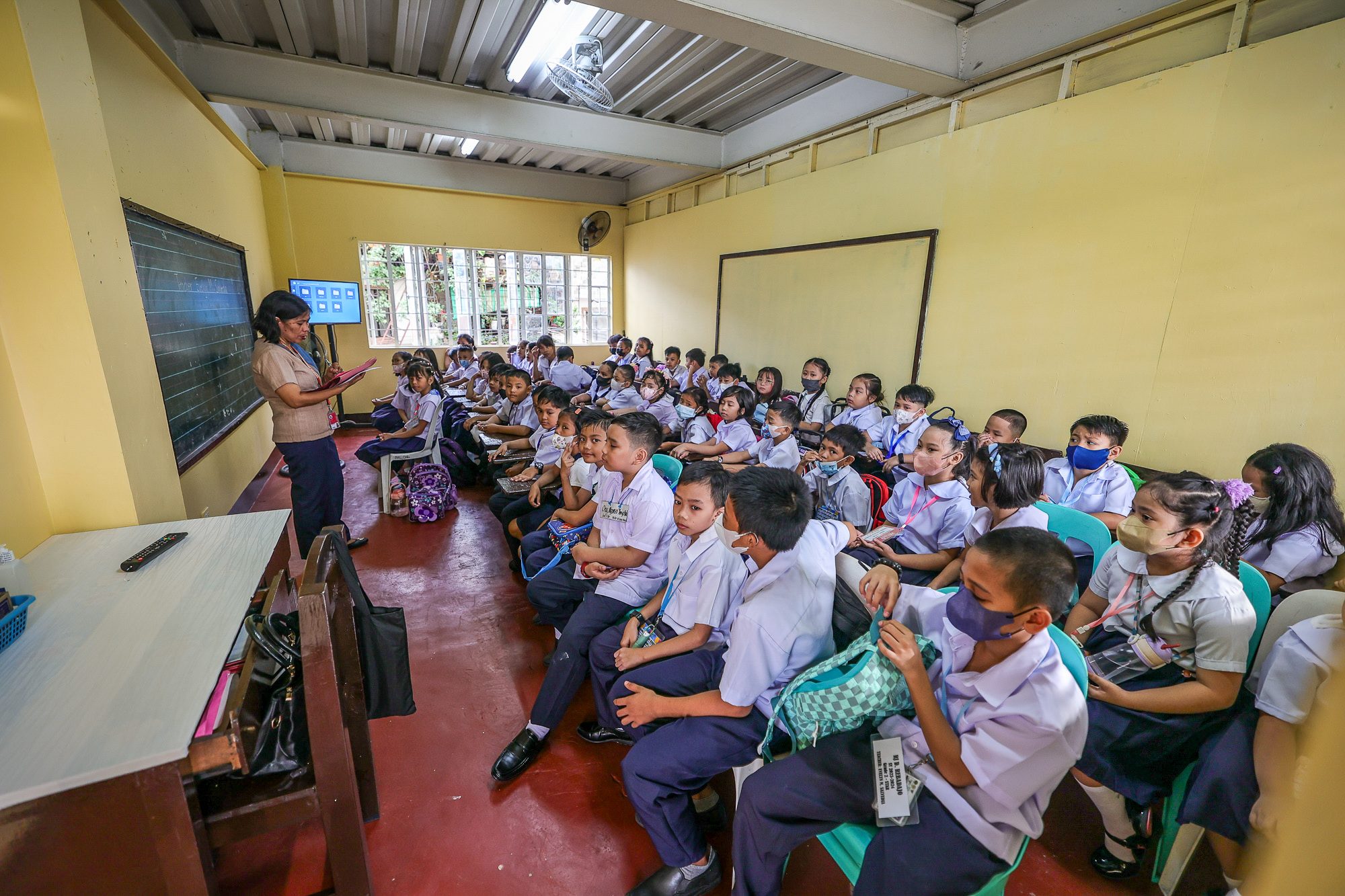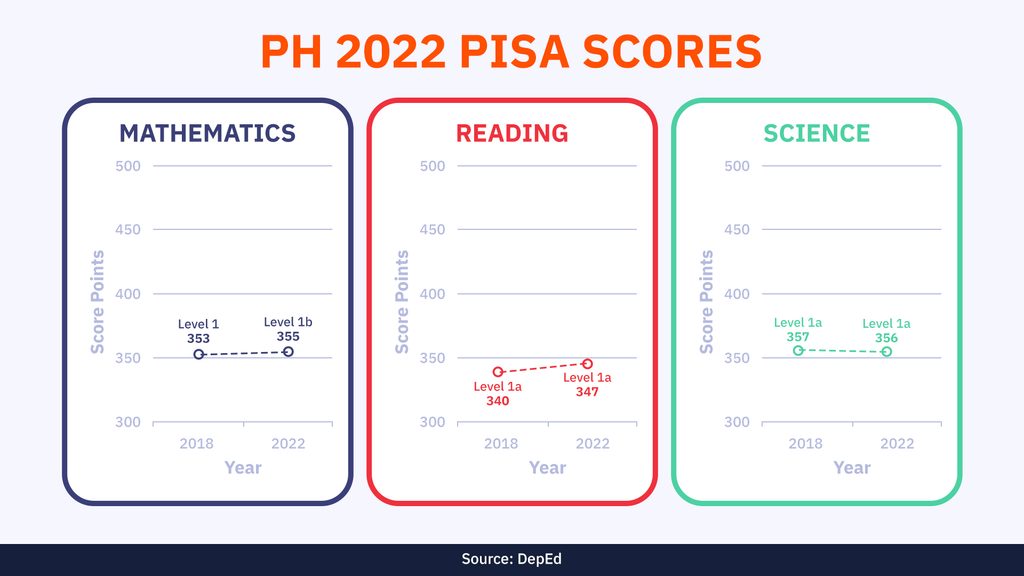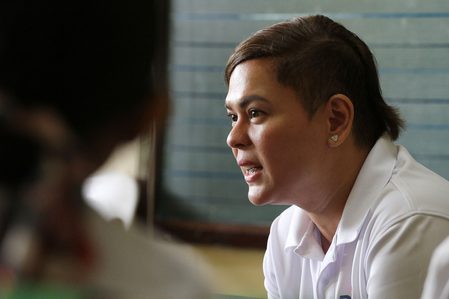SUMMARY
This is AI generated summarization, which may have errors. For context, always refer to the full article.

MANILA, Philippines – Before the Programme for International Student Assessment (PISA) 2022 rankings were released in December 2023, the Department of Education (DepEd) had already said it was not expecting “good results.”
It seemed to be the agency’s way of controlling the narrative and minimizing public backlash, if not lowering public expectations. After all, the DepEd had already faced a string of controversies in only two years of Vice President Sara Duterte’s leadership. Critics hit Duterte for what they called “misplaced priorities” in the department – from red-tagging to alleged misuse of hefty confidential funds.
ALSO ON RAPPLER
- Sara Duterte brings red-tagging to DepEd
- Why transfer of P125-M confidential funds to OVP sets dangerous precedent
“To be honest, we’re not expecting good results. So right now, we’re really focused in learning recovery. And that is why we requested that if there were realignments to be made, it should be realigned to the NLRP (National Learning Recovery Program),” DepEd Undersecretary Michael Poa said in November 2023.
Poa was right. The Philippines, once again, ended up among the countries that produced the lowest proficiency for 15-year-old students in reading, mathematics, and science, as indicated by the PISA rankings. The country ranked 77th out of 81 countries globally.
The country scored Level 1a to 1b on mathematics, reading, and science. This means that students had below minimum proficiency in all three subject areas.

At level 1a for reading, students can understand only the literal meaning of sentences or short passages. At level 1b for mathematics, they can perform only simple calculations. Lastly, at level 1a for science, they can recognize only simple scientific phenomena.

The latest PISA result begs the question: why do Filipino students continue to lag behind other countries in global education assessments?
Just ‘memorization’
At a Senate hearing on the 2022 PISA results on Wednesday, February 7, Senator Nancy Binay asked the DepEd if the questions in PISA were taught in schools in the country. “Paano maisasagot ng mga student ang questions kung hindi siya naituturo as part of the curriculum?” (How can the students answer the questions when these are not being taught as part of the curriculum?)
In response, educational psychologist and University of the Philippines professor Lizamarie Olegario said that the learning curriculum in the country is too much focused on mere “memorization” or the low ordering thinking skill, while PISA questions require analytical thinking.
“Hindi talaga siya natuturo sa classrooms natin. ‘Yung mga questions sa PISA ay practical real-life situations. Kasi dapat ‘yung tinuturo natin ay solving real-life problems, authentic learning dapat tayo,” she explained.
(They are really not being taught in our classrooms. The questions in PISA were practical real-life situations. Because what we should be teaching them are about solving real-life problems. We should teach them about authentic learning.)
Olegario said that teachers should veer away from telling students to just memorize math formulas and read fictional books. “In reading, students are so much exposed to fiction. In math, more on memorizing formulas. But in PISA, they need to analyze problems. In science, basically the experiments only ask them to follow steps. But in PISA, they have to imagine. They have to do experiments in their minds.”
Olegario also attributed the dismal performance of students to the failed implementation of the K to 12 program. “The K to 12 is not being implemented to the fullest. The task performance is still on the lower order of thinking skills [which] should be the application side or problem solving.”
Even before K to 12 was launched in 2012, many were already clamoring against the additional two years of basic education. Despite a classroom shortage, lack of textbooks, tables and chairs, the ambitious program was implemented. Policymakers and proponents of K to 12 marketed it to the public as a curriculum preparing “graduates for tertiary education, middle-level skills development, employment, and entrepreneurship.”
But former DepEd director for curriculum and development Joyce Andaya refuted Olegario’s claim. She said that “nowhere in the review did it come out that we focused on the lower level thinking skills.”
“In fact, in the review, there were very important findings. Number 1, there were overlapping. Number 2, there were misplaced competencies that should have been in grade 4 but perhaps in grade 7, and cognitive demands. There’s also high cognitive demands, meaning the curriculum has leaned towards high level than low thinking skills,” she said.
But what Andaya failed to point out was whether the teachers were teaching the way lessons should be taught. The DepEd is the biggest employer of teachers having some 900,000 teaching personnel across the country.
“From our initial discussions, we just found out that our learners and teachers are not familiar with the type of tests that are given by PISA,” Andaya said. She said that there’s need to strengthen “formative tests” in classrooms to match the PISA questions.
In an interview with Rappler on Wednesday, Philippine Business for Education’s Justine Raagas said that there were two major factors why Filipino students lagged behind other countries in PISA. These are lack of resources and the quality of teachers the country has.
Lack of resources
Raagas said that the Philippines is allotting only 3% to 4% of its gross domestic product for its education budget while the global standard is 6%. “We perform poor, and we spend less,” she said.
For one, Raagas pointed out the perennial problem of classroom and textbook shortage. “We’re hounded by problems. We lack classrooms. Learners now still share textbooks.”
In 2023, the DepEd was able to build only 3,600 new classrooms. DepEd Assistant Secretary Francis Bringas said that Philippine public schools lacked some 159,000 classrooms before school opened in August 2023. At this rate, the government would be able to address the classroom shortage in 40 years, and by that time, more problems in the education sector would have come up.
Ironically, on the lack of textbooks, the DepEd left some P3 billion worth of learning materials sitting in warehouses from 2021 to 2023. A Rappler investigation revealed that the learning materials were held hostage by logistics firm Transpac due to non-payment of fees, among other things. The materials were later released after Rappler published its report in December 2023.
Teacher quality
“Teachers are the biggest inputs to classroom learning. It’s important to have high quality teachers who are knowledgeable,” Raagas said, stressing the crucial role of teachers for some 28 million basic education students.
According to a World Bank study in 2016, the knowledge of teachers and the method they use to teach a subject were “important determinants of student learning outcomes in the Philippines.” The study showed that “knowledge of subject matter among elementary and high school teachers is low in most subjects.”

For instance, the World Bank study revealed that a mathematics teacher in high school was only able to answer 31% of the questions “completely correctly,” far from even half of the questions.
“Since the tests are closely aligned with the curriculum, the results suggest that teachers face significant challenges in teaching a considerable portion of the current K to 12 curriculum,” the study said.
How can students learn to analyze math equations if their teachers themselves are having a hard time answering them?
But Raagas said teachers shouldn’t be overburdened by the problems because they are overworked with administrative tasks rather than just teaching. “They need to be supported,” she said.
To address this, the DepEd recently released an order removing administrative tasks from teachers so they could focus on teaching. Raagas, however, said that if the DepEd would hire only 5,000 administrative staff every year, it would take years for the agency to solve the problem.
“We have to remember that we have over 47,000 schools…. Do the math, if only 5,000 year-on-year, it would take years to be completed. In the next years, we would still have overworked teachers,” Raagas said. (READ: Overworked teachers among causes of high learning poverty level in PH – experts)
For years, teachers have complained that paperwork piling up hinders them from preparing lessons.
What does the DepEd need now? Raagas said the agency needs a strong leader.
“We need a strong leadership that [will say,] ‘hey all these things need to be done.’ And the fact is that many of the reforms have to be done simultaneously,” she said.
Many critics disagreed with Duterte’s appointment as education chief. She is not an educator, and some people questioned her qualifications. But the Vice President said her experience as a mother and her background in local governance are enough. Will she take the rest of her term to learn the job? – Rappler.com
1 comment
How does this make you feel?


![[OPINYON] Tungkol sa naging viral na social media conjecture](https://www.rappler.com/tachyon/2024/07/thought-leaders-conjecture-07262024.jpg?resize=257%2C257&crop_strategy=attention)







![[WATCH] Bamban POGO scandal: There’s a bigger fish than Alice Guo](https://www.rappler.com/tachyon/2024/07/inside-track-tcard-bamban-pogo.jpg?resize=257%2C257&crop=435px%2C0px%2C1080px%2C1080px)
I appreciate the candidness of Philippine Business for Education’s Justine Raagas, who stated that the agency (DepEd) needs a strong leader. However, using the adjective “strong” may be less appropriate compared to plainly stating that she lacks the experience and educational qualification to lead DepEd. It is said that VP Sara Duterte defended herself by declaring that “her experience as a mother and her background in local governance are enough.” Unfortunately, such experience and background are insufficient or appropriate for such a position. Why should an official maintain her position when not qualified or experienced? The highest responsibility belongs to President Marcos Jr. He should urgently act on this and not prolong the suffering of affected students, teachers, and parents.